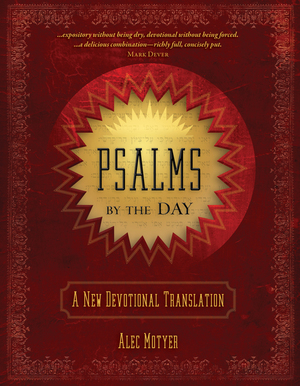This wonderful new book from renowned Old Testament scholar – preacher Alec Motyer is sure to become your first “go-to” book on the Psalms!
Foreword
By Mark Dever
One of the first – and still perhaps the best – summaries of the Bible in just a few messages that I have heard was given by Alec Motyer about twenty-five years ago. I was a student, speaking to students at the same conference. But when I saw Motyer was speaking on this topic, I could not resist attending all his lectures. And the view of God’s Word he gave me has been a lasting gift ever since.
In your hand you have three gifts. First, one of our finest scholars has used his knowledge and long experience as a linguist and a Christian to give us a fresh translation of all 150 Psalms. This in and of itself is a gift of no small value. The translation is fresh in a number of ways – the use of Yah and Yahweh, the word choice, even some modern idioms. But these translations have not been done – as they so often are – by those who are heavy in thinking of communications and light in understanding the text. Alec Motyer has tutored generations of pastors – me among them – in our understanding of God’s Word. His Christ-centered reading of the Old Testament gives a fullness and a resonance to his reading of the Psalms which seems like the way our Lord taught us to read the Psalms. And the reading is reflected even in the translation itself. If you want to know more about the way he has approached translating the Psalms, take a moment and read the introduction. Embedded within the translation, you’ll also find outlines which are suggestive for Bible study leaders and preachers in communicating the information.
Another gift that Dr Motyer has given us is in the notes. And let me be clear – in preparing to write this foreword – I read every word in the book, and the notes are themselves of great help to the Christian who would understand and appreciate the Psalms. Clear statements that would seem like hyperbole from others come with simple weight from Motyer’s pen. For example, ‘Psalm 51 is the Old Testament’s central text on repentance.’ In his notes he educates the reader on what was and was not done in Hebrew poetry. What causes some commentators to stumble in Psalm 105, he presents as an intentional emphasis by the author on our obedience. The ‘Pause for Thought’ about Hezekiah’s tunnel on Psalms 123–125 is piercing! Plenty more perspective-giving notes await the reader.
In some of them, apparent problems are solved. In others, I’ve been shown better ways to conceive what the Psalmist is saying, sometimes suggesting new avenues for understanding the whole Psalm, and often making Christ clearer in the Psalm. Again and again he reads the Psalms sensitively and persuasively as being centered on Jesus Christ. All together, even in the notes we have a rare combination of textual, grammatical knowledge of the Psalms with wide knowledge of the whole sweep of Scripture – Old and New, together with systematic theology, Christian experience, all with the warmth of a brother in Christ who knows himself to be more student than teacher, to have received more than he could ever give.
The ‘Pause for Thoughts’ devotions are a final gift that our author leaves us with. They act as a commentary for the reader who feels intimidated by the specific notes in the margins of the text. They summarize the main contribution the preceding Psalms make. And yet they are more than summary. They help to give us perspective on the significance or importance of what we’ve read, often in such a way that at least I have wanted to go back and re-read the preceding Psalm. Look at his thoughts on Psalm 37 for an example of this. Or those about hope in Psalms 61–63. Reflecting on Psalm 69, Motyer writes ‘Our only escape from the Son of Man, our Judge, is to flee to the Son of Man, our Saviour.’ His summary of the Psalms’ teaching on the messianic king in his ‘Pause for Thought’ after Psalm 72 is a tiny, splendid, encouraging tour-de-force! Pithy and learned expressions abound. ‘To abandon prayer is to embrace atheism’ (p. 246).
In these concluding ‘Pauses’, Motyer’s long Christian experience, his knowledge of the New Testament, as well as the Old, act together with the Psalm being considered to serve us. These thoughts are expository without being dry, devotional without being forced. His thoughts fl ow from an intelligent and careful reading of the Psalms immediately before him. And as we get to look over his shoulder, we learn to read the Psalms better for ourselves, and for those we may be called to teach.
Throughout this work, Motyer’s writing gives us a delicious combination – richly full, concisely put. For generations now, Alec Motyer has been one of the best at combining the smallest of details with the grand sweep of the biblical narrative, and in ways which are not wrongly original or novel, but which are faithful and obvious in the text once we’ve noticed them. Here a master of systematic and biblical theology shows us the artificial nature of that very distinction. And he does it while taking us through the church’s hymn-book, the Psalms, and all in seventy-three days! Read and profit.
Click the images below to see sample pages.





